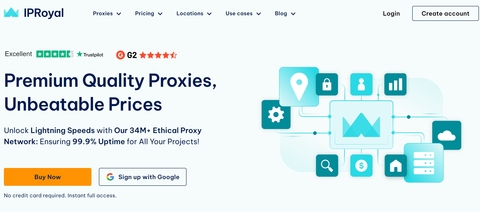IPRoyal is a premium proxy service provider offering a wide range of proxy solutions including residential, datacenter, ISP, mobile, and sneaker proxies.
They focus on providing high levels of online privacy for unrestricted internet access. IPRoyal's proxies support various use cases such as web scraping, social media management, brand protection, market research, testing, and automation.
5
List
Residential
Datacenter
Mobile
ISP
Tool
Proxy-Sale is a comprehensive proxy service provider offering a wide range of proxy solutions tailored to meet various online privacy, security, and accessibility needs. The service encompasses different types of proxies, including residential, ISP, datacenter, and mobile proxies.
With its extensive selection of proxy types and broad global coverage, Proxy-Sale provides significant advantages for users aiming to enhance their online anonymity, access geo-restricted content, and improve web browsing performance.
1
List
Residential
Datacenter
Mobile
ISP
Tool
Forward proxies act as intermediaries between a user's device and the internet. When a request is made from a device to access a resource on the internet, it first goes through the forward proxy. The proxy then forwards the request to the target server, receives the response, and sends it back to the user. This mechanism helps in anonymizing the user's IP address, enhancing security, and managing access to resources.
Technical Aspects of Forward Proxies
Forward proxies function by intercepting outgoing requests from clients and rerouting them through a different IP address. Here’s a step-by-step breakdown of their operation:
- Request Interception: The client sends a request to the proxy server.
- Forwarding the Request: The proxy server forwards the request to the target server.
- Receiving the Response: The target server sends the response back to the proxy.
- Delivering the Response: The proxy server sends the response to the client.
Configuration typically involves setting the proxy server details in the client’s network settings or using proxy management software. Forward proxies can be configured to handle HTTP, HTTPS, SOCKS5 protocols, among others.
Security and Privacy Benefits
Forward proxies enhance security by:
- Hiding IP Addresses: Masking the original IP address of the client, thus maintaining anonymity.
- Filtering Traffic: Blocking access to malicious sites and filtering out unwanted content.
- Monitoring Usage: Tracking and logging user activity for security audits and compliance.
In corporate environments, forward proxies are crucial in securing internal networks, ensuring that only authorized traffic passes through, and preventing data breaches.
Practical Applications of Forward Proxies
Forward proxies are widely used in various industries for:
- Data Scraping: Automating data collection from websites without getting banned due to high request rates.
- Access Control: Managing and controlling employee internet access within an organization.
- Content Filtering: Blocking access to inappropriate content in educational institutions.
Selecting the Right Forward Proxy
When choosing a forward proxy, consider the following factors:
- Performance: Speed and reliability are paramount. Check for low latency and high uptime.
- Scalability: Ensure the proxy can handle your required load, especially if you plan to scale operations.
- Geo-location: The ability to select IPs from different locations can be crucial for accessing geo-restricted content.
- Compliance: Ensure the provider complies with relevant data protection laws and regulations.
Popular Forward Proxy Providers
Popular Forward Proxy Providers
IPRoyal — Best overall performance
- Speed and Reliability: Fast, reliable connections.
- IP Pool Size: Extensive and diverse.
- Geo-location: Multiple global locations.
- Cost: Competitive pricing.
- Support: User-friendly with 24/7 support.
Bright Data — Ideal for large-scale tasks
- Speed and Reliability: Industry-leading performance.
- IP Pool Size: Millions of IPs.
- Geo-location: Comprehensive global coverage.
- Cost: Higher priced but feature-rich.
- Support: Detailed documentation and 24/7 support.
Proxy-Seller — Known for flexible rental options
- Speed and Reliability: High-speed, stable proxies.
- IP Pool Size: There is a good variety of IPs.
- Geo-location: Multiple countries.
- Cost: Affordable and flexible plans.
- Support: Excellent customer service.
SmartProxy — Excellent for high concurrency
- Speed and Reliability: Fast and dependable.
- IP Pool Size: Over 40 million IPs.
- Geo-location: Wide range of locations.
- Cost: Competitive and scalable pricing.
- Support: Intuitive platform with strong support.
Proxy-Cheap — Perfect for budget solutions
- Speed and Reliability: Reliable for basic needs.
- IP Pool Size: Diverse range.
- Geo-location: Several global options.
- Cost: Very affordable.
- Support: Simple interface with good support.
Performance Considerations
When evaluating forward proxies, consider:
- Speed: Essential for tasks requiring real-time data.
- Reliability: High uptime ensures continuous access to resources.
- Scalability: Ability to handle increasing traffic without performance degradation.
- Geo-location Capabilities: Useful for accessing region-specific content and services.
User Experience and Support
The quality of technical support and customer service can significantly impact your experience with a forward proxy provider. Look for providers offering:
- 24/7 Support: Ensures help is available whenever needed.
- Comprehensive Documentation: Aids in troubleshooting and setup.
- Positive User Reviews: Indicates reliability and user satisfaction.
Conclusion
Choosing the right forward proxy involves a thorough understanding of your specific needs, whether for security, data scraping, or access control. By considering performance, scalability, and support, you can select a proxy provider that best meets your requirements. Forward proxies offer significant benefits in enhancing security and managing internet traffic, making them indispensable tools in today’s digital landscape.

